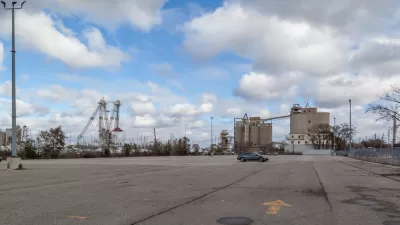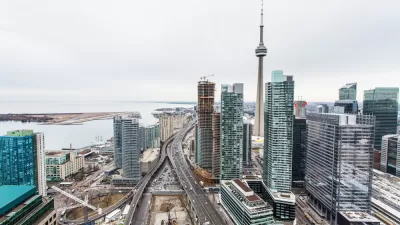Sidewalk Labs' proposals for the Toronto neighborhood of Quayside reveals a preference for ride hailing over public transit.

Paris Marx has read the response to the Request for Proposals for a high-profile "smart city" project in the Toronto neighborhood of Quayside, and what he found will not be welcome among transit advocates.
Marx points to page 133 of the proposal, finding a graph that reveals the transportation priorities of Sidewalk Labs. According to Mark, if Sidewalk Labs pursues its vision, "[t]ransit use would only increase by a single percentage point, while automobile use would be reduced to 15 percent by a larger uptake of walking and cycling (35 percent) and the use of driverless vehicles, ride hailing, and car share services (10 percent)."
There are several specific sections of the proposal that Marx reads as giving priority to ride hailing and driverless vehicles—even potentially over pedestrians and cyclists. The proposals calls for "non-hierarchical streets," for instance, would abandon the complete streets layout that most benefits alternative transportation, according to Marx. The most troubling section of the report, to Marx, is the call for shared ride zones, "where Quayside residents would get subsidized shared-ride trips instead of taking transit."
The article does highlight some portions of the proposal that provide more positives for alternative transportation modes and technological advancements that could potentially benefit every mode but eh automobile. The proposal would extend transit lines to better connect Quayside to the rest of the city's transit infrastructure. Marx is also careful to note the small scale of the project—the neighborhood only covers 12 acres, but Sidewalk Labs does have larger plans to parlay its work in Quayside to the entire East Waterfront neighborhood.
FULL STORY: Sidewalk Toronto Puts Ride Hailing Before Public Transit

Planetizen Federal Action Tracker
A weekly monitor of how Trump’s orders and actions are impacting planners and planning in America.

Map: Where Senate Republicans Want to Sell Your Public Lands
For public land advocates, the Senate Republicans’ proposal to sell millions of acres of public land in the West is “the biggest fight of their careers.”

Restaurant Patios Were a Pandemic Win — Why Were They so Hard to Keep?
Social distancing requirements and changes in travel patterns prompted cities to pilot new uses for street and sidewalk space. Then it got complicated.

Platform Pilsner: Vancouver Transit Agency Releases... a Beer?
TransLink will receive a portion of every sale of the four-pack.

Toronto Weighs Cheaper Transit, Parking Hikes for Major Events
Special event rates would take effect during large festivals, sports games and concerts to ‘discourage driving, manage congestion and free up space for transit.”

Berlin to Consider Car-Free Zone Larger Than Manhattan
The area bound by the 22-mile Ringbahn would still allow 12 uses of a private automobile per year per person, and several other exemptions.
Urban Design for Planners 1: Software Tools
This six-course series explores essential urban design concepts using open source software and equips planners with the tools they need to participate fully in the urban design process.
Planning for Universal Design
Learn the tools for implementing Universal Design in planning regulations.
Heyer Gruel & Associates PA
JM Goldson LLC
Custer County Colorado
City of Camden Redevelopment Agency
City of Astoria
Transportation Research & Education Center (TREC) at Portland State University
Camden Redevelopment Agency
City of Claremont
Municipality of Princeton (NJ)




























